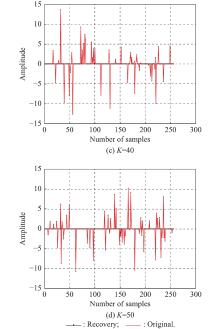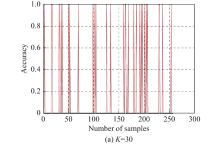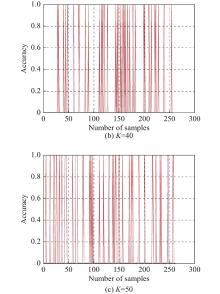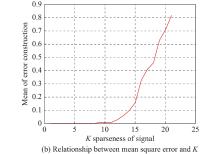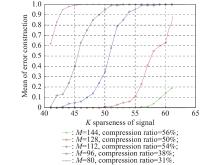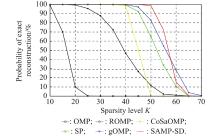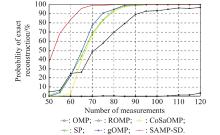| 1 |
BEYGI S, ALALI S, MALEKI A, et al An efficient algorithm for compression-based compressed sensing. Information and Inference, 2019, 8 (2): 343- 375.
doi: 10.1093/imaiai/iay014
|
| 2 |
BOYER C, BIGOT J, WEISS P Compressed sensing with structured sparsity and structured acquisition. Applied and Computational Harmonic Analysis, 2019, 46 (2): 312- 350.
doi: 10.1016/j.acha.2017.05.005
|
| 3 |
SANDEEP V, NEETU S, AJAY K S Genetic algorithm-based optimized cluster head selection for single and multiple data sinks in heterogeneous wireless sensor network. Applied Soft Computing, 2019, 85, 105788.
doi: 10.1016/j.asoc.2019.105788
|
| 4 |
SANDEEP V, NEETU S, AJAY K S A novelistic approach for energy efficient routing using single and multiple data sinks in heterogeneous wireless sensor network. Peer-to-Peer Networking and Applications, 2019, 12 (5): 1110- 1136.
doi: 10.1007/s12083-019-00777-5
|
| 5 |
MARK A D, ANDREW K M, DEANNA N, et al Constrained adaptive sensing. IEEE Trans. on Signal Processing, 2016, 46 (2): 5437- 5449.
|
| 6 |
SANDEEP V, RICHA M, DIVYA S, et al Wireless sensor network and hierarchical routing protocols: a review. International Journal of Computer Trends and Technology, 2013, 4 (8): 2411- 2416.
|
| 7 |
THOMAS B, MIKE E D. Iterative hard thresholding for compressed sensing. Applied and Computational Harmonic Analysis, 2009, 27 (3): 265- 274.
doi: 10.1016/j.acha.2009.04.002
|
| 8 |
TROPP J A, GILBERT A C Signal recovery from random measurements via orthogonal matching pursuit. IEEE Trans. on Information Theory, 2007, 53 (12): 4655- 4666.
doi: 10.1109/TIT.2007.909108
|
| 9 |
DEANNA N, ROMAN V Uniform uncertainty principle and signal recovery via regularized orthogonal matching pursuit. Foundations of Computational Mathematics, 2019, 9 (3): 317- 334.
|
| 10 |
DEANNA N, ROMAN V Signal recovery from incomplete and inaccurate measurements via regularized orthogonal matching pursuit. IEEE Journal of Selected Topics in Signal Processing, 2010, 4 (2): 310- 316.
doi: 10.1109/JSTSP.2010.2042412
|
| 11 |
LIU E, VLADIMIR N T The orthogonal super greedy algorithm and applications in compressed sensing. IEEE Trans. on Information Theory, 2011, 58 (4): 2040- 2047.
|
| 12 |
WEI D, OLGICA M Subspace pursuit for compressive sensing signal reconstruction. IEEE Trans. on Information Theory, 2009, 55 (5): 2230- 2249.
doi: 10.1109/TIT.2009.2016006
|
| 13 |
QUN M, SHEN Y A remark on the restricted isometry property in orthogonal matching pursuit. IEEE Trans. on Information Theory, 2012, 58 (6): 3654- 3656.
doi: 10.1109/TIT.2012.2185923
|
| 14 |
LJUBISA S, MILOS B Analysis of the reconstruction of sparse signals in the DCT domain applied to audio signals. IEEE/ACM Trans. on Audio, Speech, and Language Processing, 2018, 26 (7): 1220- 1235.
doi: 10.1109/TASLP.2018.2819819
|
| 15 |
MADYCH W R. Solutions of underdetermined systems of linear equations. Lecture Notes-Monograph Series, 1991, 20(3): 227−238.
|
| 16 |
NEEDELL D, TROPP J A CoSaMP: iterative signal recovery from incomplete and inaccurate samples. Applied and Computational Harmonic Analysis, 2009, 26 (3): 301- 321.
doi: 10.1016/j.acha.2008.07.002
|
| 17 |
THONG T D, LU G, NAM N, et al Sparsity adaptive matching pursuit algorithm for practical compressed sensing. Proc. of the IEEE Conference on Signals, Systems and Computers, 2009, 581- 587.
|
| 18 |
NI J M, SUN Q Z, LU J M A modified adaptive compressive sampling matching pursuit algorithm. Communications Technology, 2016, 49 (8): 992- 996.
|
| 19 |
JOHN Z S, VIVEK K G Optimal quantization of random measurements in compressed sensing. Proc. of the IEEE International Symposium on Information Theory, 2009, 6- 10.
|
| 20 |
LUO Y J, GUI G, CONG X C, et al Sparse estimation based on a new random regularized matching pursuit generalized approximate message passing algorithm. Entropy, 2016, 18 (6): 207.
doi: 10.3390/e18060207
|
| 21 |
WANG X, ZHANG Y X, HUANG Z Q Regularized backtracking adaptive pursuit algorithm based variable step-size. Acta Electronic Sinica, 2018, 46 (8): 1829- 1834.
|
| 22 |
JARVIS H, RUI M C, ROBERT N Distilled sensing: adaptive sampling for sparse detection and estimation. IEEE Trans. on Information Theory, 2011, 57 (9): 6222- 6235.
doi: 10.1109/TIT.2011.2162269
|
| 23 |
WANG Z R, LI B, LIU N H, et al. Distilling knowledge from an ensemble of convolutional neural networks for seismic fault detection. IEEE Geoscience and Remote Sensing Letters. DOI: 10.1109/LGRS.2020.3034960.
|
| 24 |
JARVIS D H, RICHARD G B, RUI M C, et al Compressive distilled sensing: sparse recovery using adaptivity in compressive measurements. Proc. of the 43rd Asilomar Conference on Signals, Systems and Computers, 2009, 1551- 1555.
|
| 25 |
SHEN Z Y, CHEN X M, WANG Q Q A cooperative construction method for the measurement matrix and sensing dictionary used in compression sensing. EURASIP Journal on Advances in Signal Processing, 2010, 10, 1- 8.
doi: 10.1186/s13634-020-0661-1
|
| 26 |
KARIN S, PIERRE V Dictionary preconditioning for greedy algorithms. IEEE Trans. on Signal Processing, 2008, 56 (5): 1994- 2002.
doi: 10.1109/TSP.2007.911494
|
| 27 |
LI J. Research on deterministic measurement matrix and sparse recovery algorithm with applications to WCSS. Harbin, China: Harbin Institute of Technology, 2016. (in Chinese)
|
| 28 |
WANG J, SEOKBEOP K, BYONGHYO S Generalized orthogonal matching pursuit. IEEE Trans. on Signal Processing, 2012, 60 (12): 6202- 6216.
doi: 10.1109/TSP.2012.2218810
|
| 29 |
LJUBISA S, DANILO P M, MILOS D, et al Demystifying the coherence index in compressive sensing. IEEE Signal Processing Magazine, 2020, 37 (1): 152- 162.
doi: 10.1109/MSP.2019.2945080
|
| 30 |
ZHANG L Q, HUANG L, LI B Adaptive sensing matrix design for greedy algorithms in MMV compressive sensing. Proc. of the 2019 IEEE International Conference on Acoustics, Speech and Signal Processing, 2019, 5571- 5575.
|
| 31 |
LI B. Research on generalized OMP algorithm and dictionaries construction in compressive sensing. Harbin, China: Harbin Institute of Technology, 2015. (in Chinese)
|
 ), Qianqian WANG1,2(
), Qianqian WANG1,2( ), Xinmiao CHENG1,3(
), Xinmiao CHENG1,3( )
)
